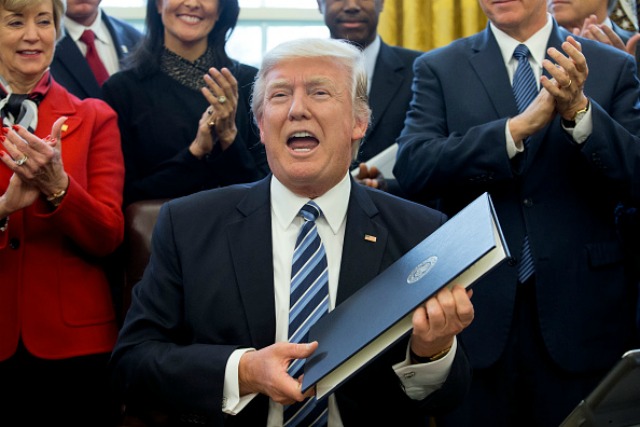Trump's Order To Review H-1B Visas Could Spur Opposite Effect, If It Has One At All
By Stephen Gossett in News on Apr 18, 2017 4:26PM

Getty Images / Pool
President Donald Trump is set to officially take aim at the H-1B guest worker visa program on Tuesday—even as the move may immediately be more about perception than legislative reality.The president is expected to sign an executive order that will review the visa program, which allows 85,000 high-skilled workers into the country annually (many for jobs in the tech industry). Trump in the past has vowed to dismantle the program, saying it allows companies to replace American jobs with low-wage foreign workers, while the tech sector says its a vital engine of the industry.
Trump is expected to sign the order, dubbed “Buy American, Hire American,” in Wisconsin, at Snap-On Tools in Kenosha.
The number of H-1B applicants has actually been on the decline this year, as Trump’s rhetoric appears to have played a part in reversing what had been a four-year upward climb. Even with much attention paid over the supposedly diminished role of strategist Stephen Bannon, the order is a clear continuation of the economic-nationalism line that he and White House senior advisor Stephen Miller—never fan of the H-1b program—clamor for.
Slowing these visas has been a goal of Stephen Miller for some time, long predating Trump https://t.co/ifiGX3wPC7
— Maggie Haberman (@maggieNYT) April 18, 2017
The administration's take is that an eventual overhaul would make employers prove that “the most highly skilled workers” are getting such visas, thereby dissuading industries from seeking what the White House characterizes as cheap labor. But the net effect would drive companies overseas, according to Robert D. Atkinson, president of the Information Technology and Innovation Foundation.
“The effect would end up being exactly the opposite of what Trump wants,” Atkinson told the New York Times. “Companies would go offshore, like Microsoft did with Vancouver, Canada,” to seek talent."
A the same time, it should be emphasized that, like some of Trump's early orders, the order appears to have no immediate teeth and, as Wired points out, could be more about achieving anti-immigration optics while keeping markets placated.
"One should not mistake PR for policy. The media just follows along and says, ‘Oh, the president is issuing another executive order. He’s changing the world,’ but he’s not," Bruce Morrison, an IT lobbyist, told Wired.
Here is the long game that White House reportedly has in mind, according to the Washington Post:
"The [administration] officials said reform could first come through administrative changes, such as raising the visa application fees, adjusting the wage scale to more accurately reflect prevailing salaries in the tech industry, and more vigorously enforcing violations. It could also change the lottery system to give foreigners with U.S. master’s degrees a leg up."
(There is indeed a serious conversation to be had about the lottery, especially in cases such as this in which training leads to a sort of piggybacked outsourcing, but the kind of nuanced, departmental reform study that would probably be more appropriate just isn't as splashy.)
Meanwhile, the irony of a tech-targeted order (whether toothsome or toothless) coming from a president who relies on foreign workers to in part staff his hotel operations was not lost on the commentariat.
I know Bannon dreams of running H1B visa-holders out of Silicon Valley, but does the EO cover Trump's Eastern European Mar-a-Lago workforce? https://t.co/COZX80zNvQ
— Joy Reid (@JoyAnnReid) April 18, 2017